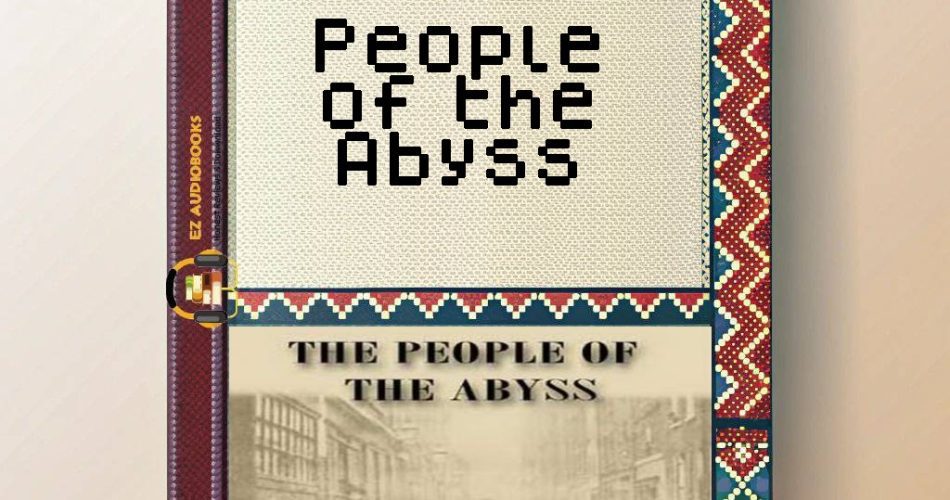Audiobook Sample
Listen to the sample to experience the story.
Please wait while we verify your browser...
- Title: People of the Abyss
- Author: Jack London
- Narrator: Peter Yearsley
- Length: 06:28:59
- Version: Abridged
- Release Date: 01/01/2016
- Publisher: LibriVox
- Genre: Non-Fiction, Science & Technology, Social Science
- ISBN13: SABLIB9782207
There are books that entertain, books that educate, and then there are books that leave permanent fingerprints on your soul. Jack London’s “People of the Abyss” belongs firmly in the latter category. As I listened to Peter Yearsley’s narration of this harrowing account of East End poverty, I found myself transported not just to 1902 London, but to my own grandmother’s kitchen in Manchester, where she’d recount stories of her childhood during the Great Depression. The same hollow-eyed desperation London describes – the gnawing hunger, the threadbare dignity – echoed in her voice sixty years later. That’s the power of this work: it makes history visceral and personal.
London’s immersive journalism reads like dystopian fiction, except every word is tragically real. He doesn’t just observe poverty; he lives it – sleeping in workhouses, queuing for gruel, wearing lice-infested rags. What emerges is a systematic dismantling of Victorian England’s facade of progress. Through Yearsley’s gravelly, compassionate narration, we hear the clatter of wooden clogs on cobblestones, the wheezing coughs of tuberculosis patients, the silent screams of women selling themselves for a loaf of bread. The narrator’s pacing is masterful – lingering on London’s most damning passages about wealth inequality while letting quieter moments of human connection resonate.
Several scenes linger like ghosts: London’s description of elderly workers literally dying at their factory machines (their corpses carried out at shift change so production isn’t interrupted) made me pause my morning commute, suddenly ashamed of my coffee’s warmth in my hands. Yearsley’s voice cracks appropriately when delivering London’s indictment: ‘The food this managing class eats… is challenged by eight million mouths which have never had enough.’ The audio format intensifies the emotional impact – you can’t skim past suffering when it’s whispered directly into your ears during an evening walk.
Technically, this LibriVox recording has occasional background noise (a creaking chair, a distant siren), but these imperfections oddly enhance the experience. This isn’t a polished studio production; it’s raw testimony, much like London’s text. Yearsley adopts subtle Cockney accents for dialogue without caricature, honoring the humanity of London’s subjects. His narration highlights London’s dual role as both investigative reporter and passionate advocate – the passages analyzing systemic economic failure land with scholarly precision, while descriptions of a child’s frostbitten feet ache with unvarnished outrage.
Compared to similar works like Orwell’s “Down and Out in Paris and London”, this feels more urgently confrontational. Where Orwell philosophizes, London documents with photographic specificity. The audiobook format makes Engels’ “Condition of the Working Class” seem abstract by comparison – here, you hear the rustle of newspaper bedding in homeless shelters. Modern listeners will draw chilling parallels to tent cities and food banks, proving London’s warning about ‘the Abyss’ remains terrifyingly relevant.
Yet for all its darkness, glimmers of hope emerge – the shared pipe among dockworkers, the street urchin who shares his last crust. Yearsley’s warm baritone cradles these moments tenderly, reminding us that solidarity persists even in hell. I found myself replaying Chapter 7’s account of a Salvation Army shelter, where London notes ‘the cleanliness of poverty’ – a phrase Yearsley delivers with heartbreaking dignity.
This isn’t an easy listen, but essential. Pair it with Margaret Macmillan’s “The War That Ended Peace” for historical context, or with Matthew Desmond’s “Evicted” for contemporary resonance. Keep tea nearby for comfort, and prepare to view your own privileges with uncomfortable clarity. The final chapter’s description of a homeless man’s death by ‘inanition’ (a word Yearsley pronounces with devastating care) will haunt you for weeks – as it should.
In solidarity and story, Sophie
Sophie Bennett

